In CAR-T therapy, CD19 is now the most extensively used target. It has been confirmed to be effective and safe for the treatment of CLL, B-ALL and B cell lymphoma. FMC63, an IgG2a mouse monoclonal antibody, targets CD19.
To date, a majority of the reported CART19 trials include the anti-CD19 scFv extracted from FMC63, such as both the FDA-approved CARs Kymriah and Yescarta.
Although the therapeutic results for CD19-specific CAR-T cells have been impressive, the quality control at the time of therapy manufacture has been an area where more progress is still needed. The high-affinity CD19 proteins from ACROBiosystems exhibit the potential to effectively detect the anti-CD19 CAR expression on the surface of transduced T cells. These proteins have been recognized widely for their superior sensitivity and specificity.
The ACROBiosystems high-affinity CD19 proteins have found extensive use for the quality control release testing and pharmacokinetic (PK) analysis of anti-CD19 CAR-T cells in clinical trials.
With positive feedback related to its high-affinity CD19 proteins available in the market, ACROBiosystems has now created an anti-idiotypic antibody against FMC63 scFv, known as Monoclonal Anti-FMC63 scFv Antibody. This antibody has the potential to specifically recognize the antigen-recognition domain of FMC63 derived anti-CD19 CARs with superior sensitivity and specificity.
The anti-FMC63 scFv monoclonal antibody’s performance was verified in house through flow cytometry (FCM), and it was found to be ideal for the detection of FMC63-derived anti-CD19 CARs in clinical trials.
Product list
Table 1. Source: ACROBiosystems
| Molecule |
Cat. No. |
Source |
Product Description |
| FMC63 |
FM3-Y45 |
Hybridoma |
Monoclonal Anti-FMC63 scFv Antibody, Mouse IgG1 (Y45) |
| FM3-Y45P1 |
HEK293 |
Monoclonal Anti-FMC63 scFv Antibody, Mouse IgG1 (Y45) (HEK293) |
| FM3-FY45 |
Hybridoma |
FITC-Labeled Monoclonal Anti-FMC63 scFv Antibody, Mouse IgG1 (Y45)New |
| FM3-BY45 |
Hybridoma |
Biotinylated Monoclonal Anti-FMC63 scFv Antibody, Mouse IgG1 (Y45)New |
| FM3-BY54 |
HEK293 |
Biotinylated Monoclonal Anti-FMC63 scFv Antibody, Mouse IgG1, Avitag™ (Y45) |
| FM3-HPY53 |
HEK293 |
PE-Labeled Monoclonal Anti-FMC63 scFv Antibody, Mouse IgG1 (Y45) (Site-specific conjugation) |
| FM3-S93 |
|
Rabbit Anti-Mouse FMC63 scFv Polyclonal Antibody (recommended for ADA assay) (MALS verified) |
Product features
No background staining when detecting FMC63 derived Anti-CD19 CARs in clinical trials
Detection of anti-CD19 (FMC63) CAR expression
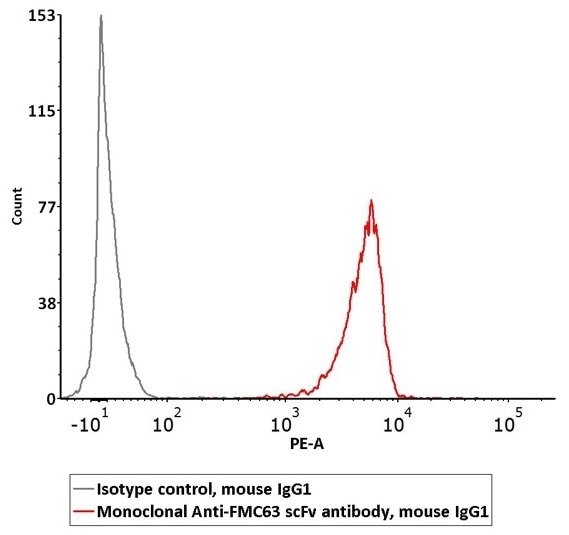
2e5 of FMC63 scFv-based anti-CD19 CAR-293 cells were stained with 100 µL of the working solution of Monoclonal AntiFMC63 scFv Antibody, Mouse IgG1 (Cat. No. FM3-Y45) and isotype control respectively, washed and then followed by PE anti-mouse IgG1 Antibody and analyzed with flow cytometry (QC tested). Image Credit: ACROBiosystems
Assessment of non-specific binding to 293 cells
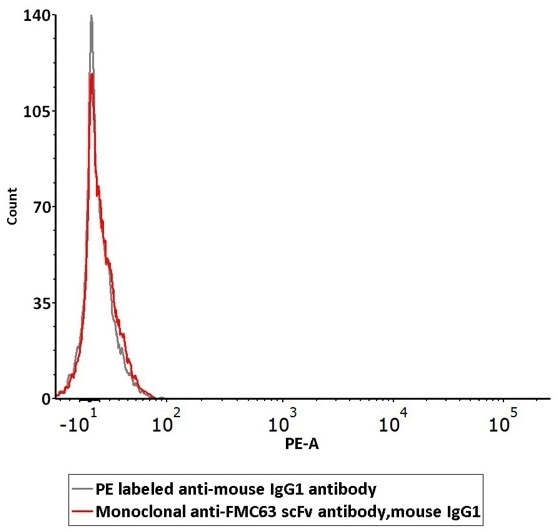
Non-specific binding of Monoclonal Anti-FMC63 scFv Antibody (Cat. No. FM3-Y45) to non-transfected 293 cells was determined by flow cytometry. The data showed that Anti-FMC63 scFv Antibody didn’t bind to non-transfected 293 cells. Image Credit: ACROBiosystems
Assessment of non-specific binding to PBMCs
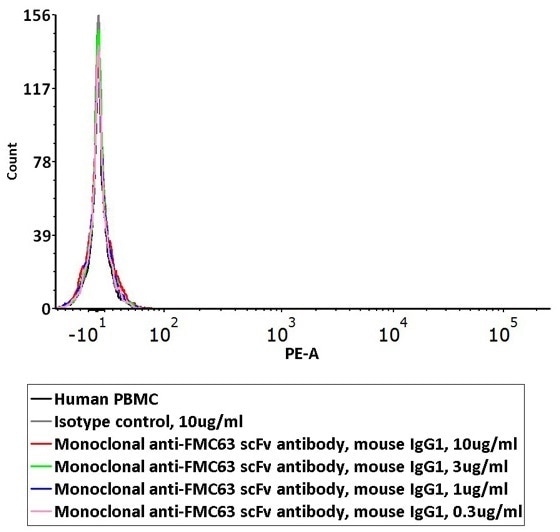
Non-specific binding of Monoclonal Anti-FMC63 scFv Antibody (Cat. No. FM3-Y45) to non-transfected human PBMCs was determined by flow cytometry. The data showed that Anti-FMC63 scFv Antibody didn’t bind to non-transfected human PBMCs. Image Credit: ACROBiosystems
Specifically recognize the antigen-binding site of FMC63 derived CARs with high affinity
Binding activity and specificity measured by ELISA
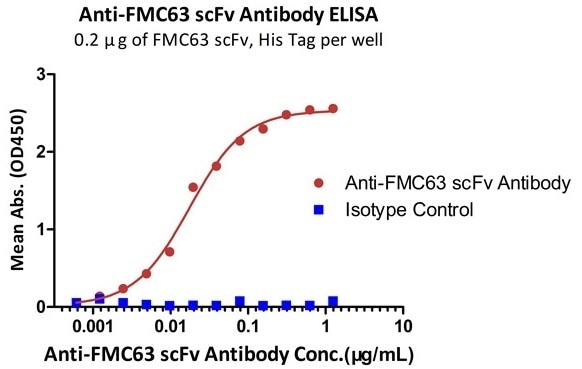
Immobilized FMC63 scFv, His Tag at 2 μg/mL (100 μL/well) can bind Monoclonal Anti-FMC63 scFv Antibody, Mouse IgG1 (Clone Y45) with a linear range of 1-19 ng/mL. Anti-DNP antibody, mouse IgG1 (Cat. No. DNP-M1) was used as an isotype control (QC tested). Image Credit: ACROBiosystems
Neutralizing activity measured by ELISA
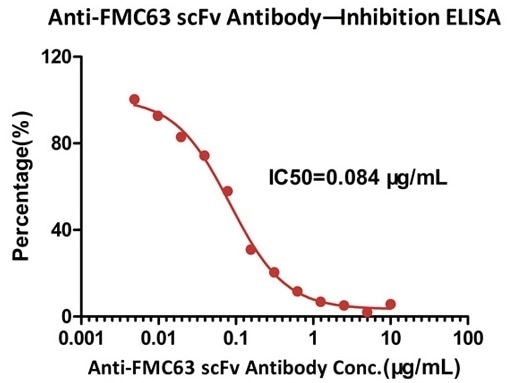
ELISA analysis shows that the binding of Human CD19, Fc Tag (Cat. No. CD9-H5251) to FMC63 scFv, His Tag was inhibited by increasing concentration of Monoclonal Anti-FMC63 scFv Antibody, Mouse IgG1 (Clone Y45). The concentration of Human CD19, Fc Tag used is 5 μg/mL (100 μL/well). The IC50 is 0.084 μg/mL (Routinely tested). Image Credit: ACROBiosystems
High affinity determined by SPR
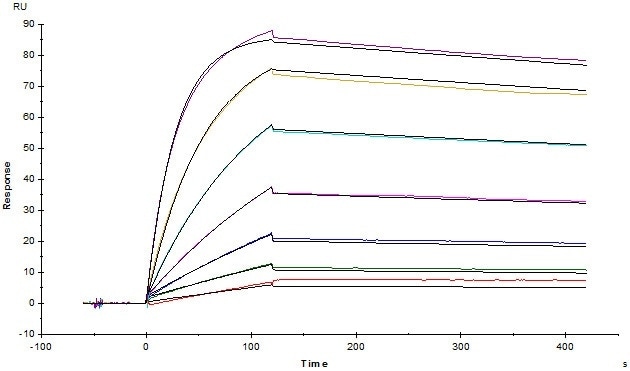
Monoclonal Anti-FMC63 scFv Antibody, Mouse IgG1 (Cat. No. FM3-Y45) captured on CM5 chip via anti-mouse antibodies surface can bind FMC63 scFv with an affinity constant of 1.08 nM as determined in an SPR assay. Image Credit: ACROBiosystems
Product list of high affinity CD19 proteins
Table 2. Source: ACROBiosystems
| Molecule |
Cat. No. |
Source |
Product Description |
Structure |
| CD19 |
CD9-HP2H3 |
HEK293 |
PE-Labeled Human CD19 (20-291) Protein, His
Tag (Site-specific conjugation)Hot |
|
| CD9-H5251 |
HEK293 |
Human CD19 (20-291) Protein, Fc Tag, low endotoxin (Super affinity, MALS verified) DMF FiledHot |
|
| CD9-H52H2 |
HEK293 |
Human CD19 (20-291) Protein, His Tag DMF FiledHot |
|
| CD9-H5259 |
HEK293 |
Human CD19 (20-291) Protein, Fc Tag, low endotoxin |
|
| CD9-H5250 |
HEK293 |
Human CD19 (20-291) Protein, Llama IgG2b Fc Tag, low endotoxin |
|
| CD9-H5258 |
HEK293 |
Human CD19 (20-291) Protein, Mouse IgG2a Fc Tag |
|
| CD9-HF2H2 |
HEK293 |
FITC-Labeled Human CD19 (20-291) Protein, His Tag DMF FiledHot |
|
| CD9-HF251 |
HEK293 |
FITC-Labeled Human CD19 (20-291) Protein, Fc Tag DMF FiledHot |
|
| CD9-HF2H3 |
HEK293 |
FITC-Labeled Human CD19 (20-291) Protein, His Tag Star Staining |
|
| CD9-H8259 |
HEK293 |
Biotinylated Human CD19, Fc Tag, ultra
sensitivity (primary amine labeling) DMF Filed |
|
| CD9-H82F7 |
HEK293 |
Biotinylated Human CD19 (20-291) Protein, Fc, Avitag™Hot |
|
| CD9-H82E9 |
HEK293 |
Biotinylated Human CD19 (20-291) Protein, His, Avitag™ (SPR verified)Hot |
|
| MBS-K005 |
|
Human CD19-coupled Magnetic Beads |
|
| CD9-C5251 |
HEK293 |
Cynomolgus / Rhesus macaque CD19 (20-292) Protein, Fc Tag |
|
| CD9-C5221 |
HEK293 |
Cynomolgus / Rhesus macaque CD19 (20-292) Protein, His Tag |
|